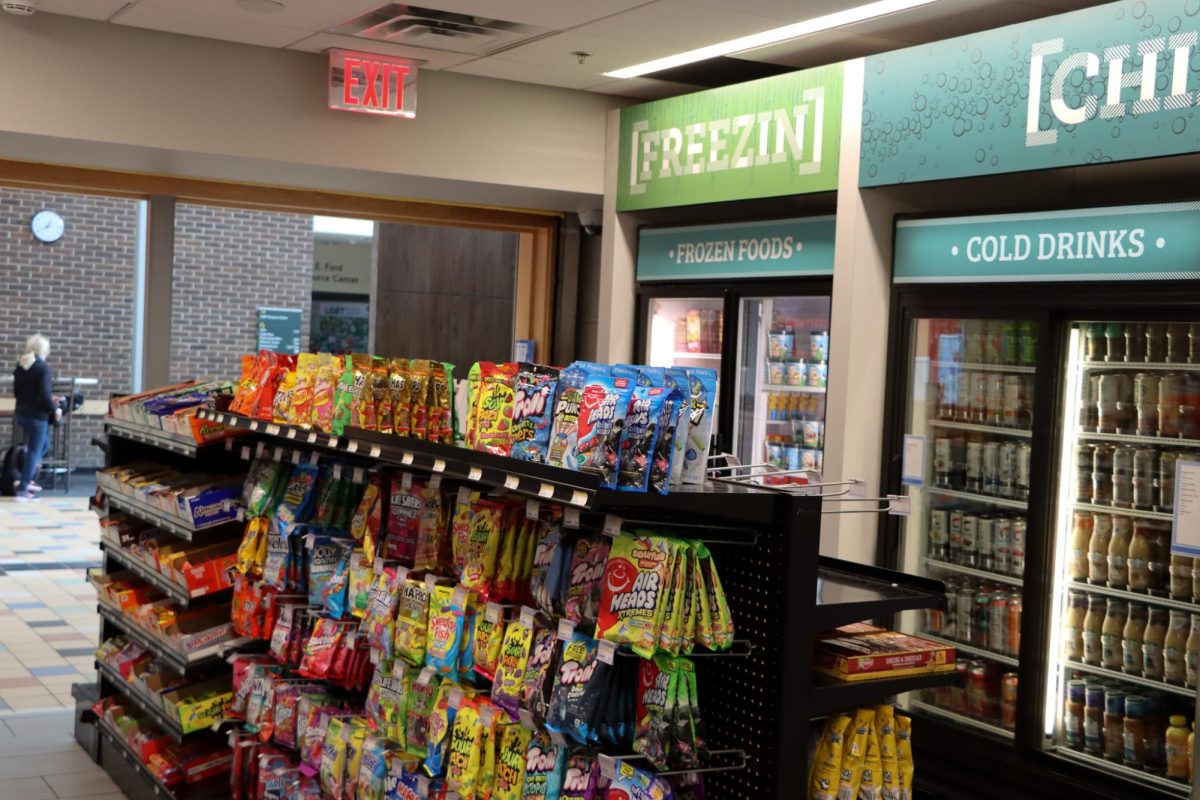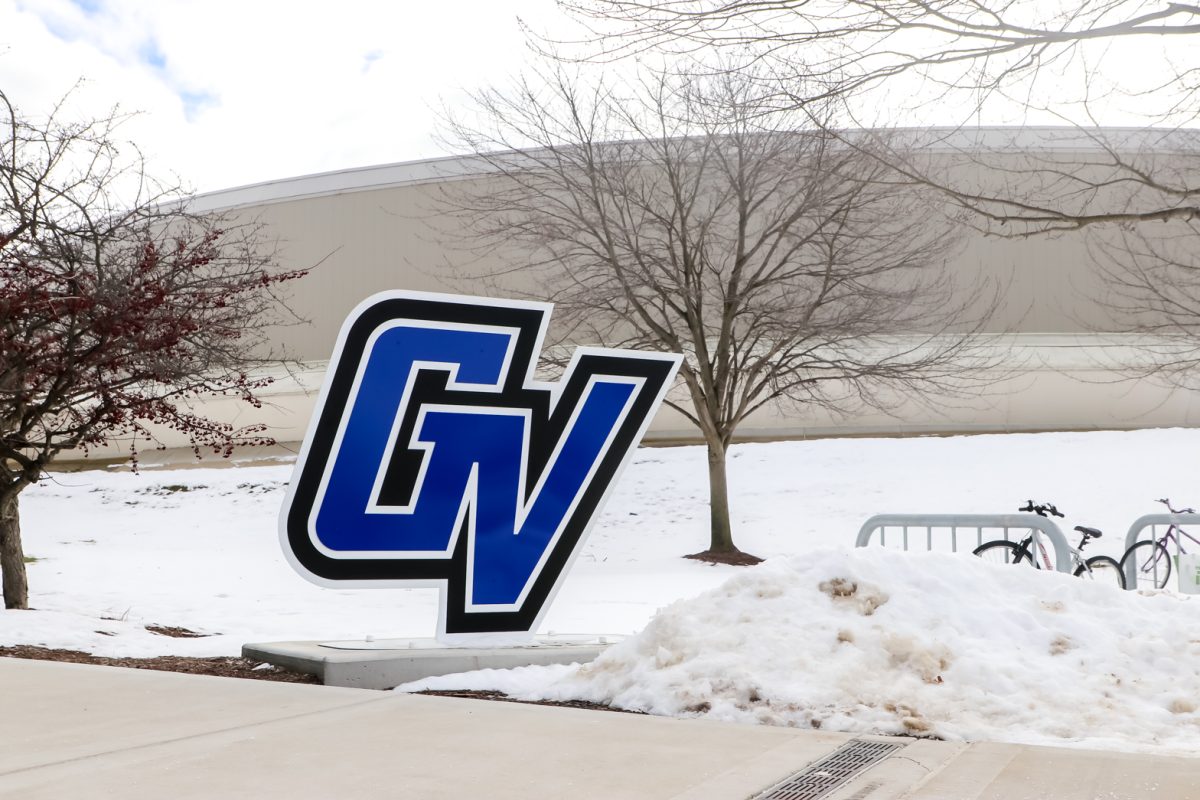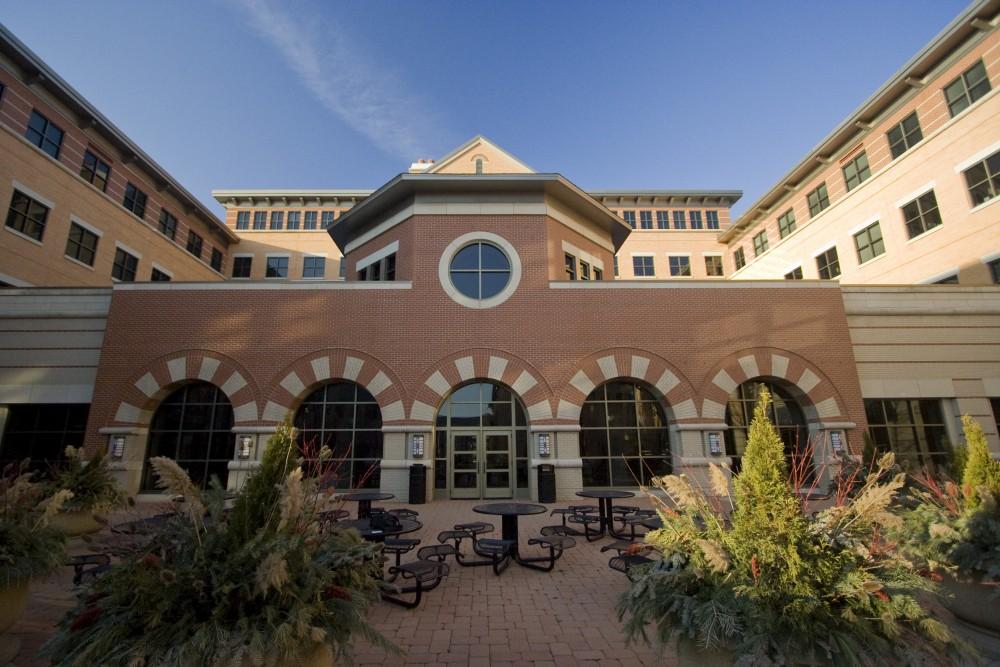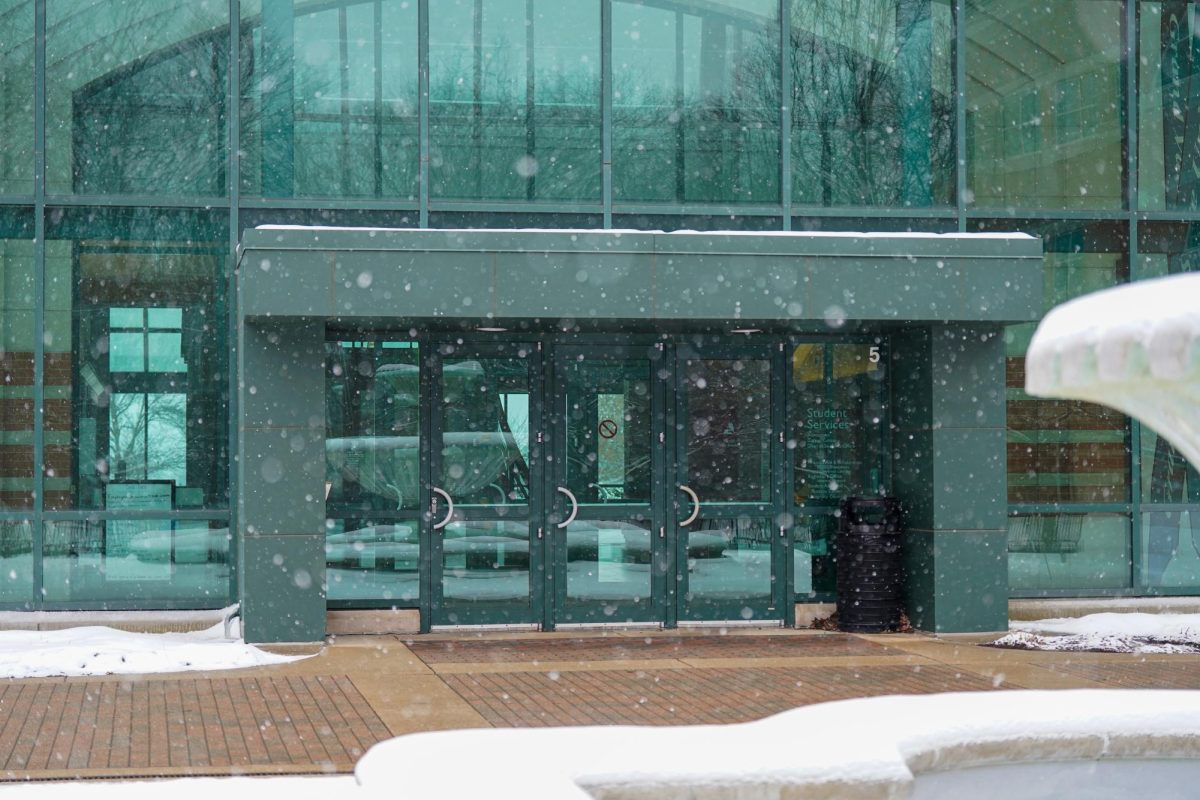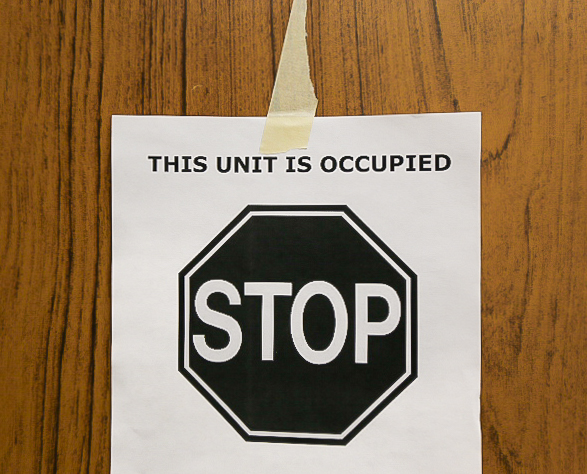Grand Valley State University’s campus stores sell products to students at heavily inflated rates, sometimes as high as about 360% more then the item’s original market value.
Clare Meteer, a Grand Valley State University senior majoring in Business Management and Dance, recently noticed she needed allergy medication. Meteer does not have a car and had very little time in between classes, so she decided to go to the Kirkhof Center C-Store, a convenience store on campus that is part of GVSU’s Laker Food Co., formerly known as Campus Dining, to buy some Claritin.
In a hurried state, Meteer grabbed the only box of Claritin. The register rang her up $5.29 before tax; she paid and went on her way. Later, she opened the box to find only one tablet. Meteer was shocked that she spent $6 on a single tablet of medicine that she had no other way to access on campus.
Frustrated, Meteer decided to look on Amazon. A ten-pack of Claritin costing about $10 equated to about $1 a tablet, versus the $6 she paid at the C-Store on campus.
“I get that it’s probably going to be a little bit more expensive when I’m on campus, but I think that this much is crazy,” Meteer said.
A quick price comparison revealed that the cost of over-the-counter allergy medicine at GVSU C-Stores is much higher than the local Meijer, Family Fare and Walgreens locations near the Allendale Campus. At Meijer, a 10-pack of non-drowsy Claritin is $11.49 before tax, which equates to about $1.15 per tablet. This puts the campus stores’ selling of essentially the same product at a markup rate of over 300%. At Family Fare, the Claritin 10-pack cos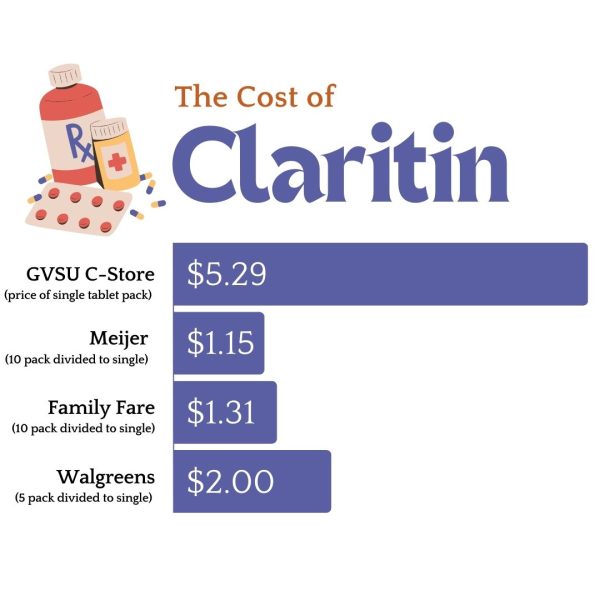 ts $13.79, or $1.31 a piece, and at Walgreens, a five-pack of Claritin costs $9.99, about $2 each
ts $13.79, or $1.31 a piece, and at Walgreens, a five-pack of Claritin costs $9.99, about $2 each
Although Allendale students can access these locations by car or bus, they are not within walking distance for students.
“I don’t have a car, and there’s also many students who don’t have a car, and this is like one of the main places we can buy things,” Meteer said. “I think that, that makes it unethical, especially when it comes to medicine and things like necessities.”
GVSU Associate Professor of Marketing Vivek Dalela said although the price hikes can be uncomfortable for students they are a common economic concept.
Dalela attributed the nature of higher prices at GVSU P.O.D. (provisions on demand stores) and C-Stores to the concepts of the economies of scale and captive market.
Dalela explained that economies of scale mean that businesses like Walmart or Meijer can buy in bulk- thus allowing the products to be sold at a lower cost.
“If you’re able to sell a lot, the price per unit goes down. (Businesses) buy in wholesale, (the customer buys) it cheaper,” Dalela said. “Walmart does the most economies of scale, so it sells it cheapest. You go to CVS or Walgreens and you try to buy the same product, they have lesser economies of scale, so their prices are high. You go to a mom-and-pop store, for example, and they have even less of an economy of scale. The less you sell, the higher the price will be.”
Dalela said this concept can apply to the GVSU P.O.D. and C-Stores because they are serving a smaller market of students, with less business and at a lesser volume than bigger stores, so the cost will be higher. Dalela said to make the business viable, on-campus stores may have to keep the prices higher to pay for fixed expenses and to make the business work.
Additionally, a captive market has less competition and customers are more likely to buy out of convenience or necessity. Dalela compared this to airports, where travelers pay higher prices because they have no other option, and there are no competitors to drive down prices.
“They will be willing to pay a higher price just for the convenience of it because they don’t want to walk five miles or drive down to get to another store, they don’t have a choice,” Dalela explained.
This concept is reflected in the GVSU C-Store and P.O.D. store prices.
In addition to the medicine sold on campus, other prices reflect price hikes that could be attributed to the concepts Dalela notes. For instance, GVSU charges $1.29 for a single pack of ramen noodles while Meijer and Family charge only 39 cents. Similarly, GVSU charges $3.59 for a single Chapstick original, while Meijer charges $1.49 and Family Fare $1.59. 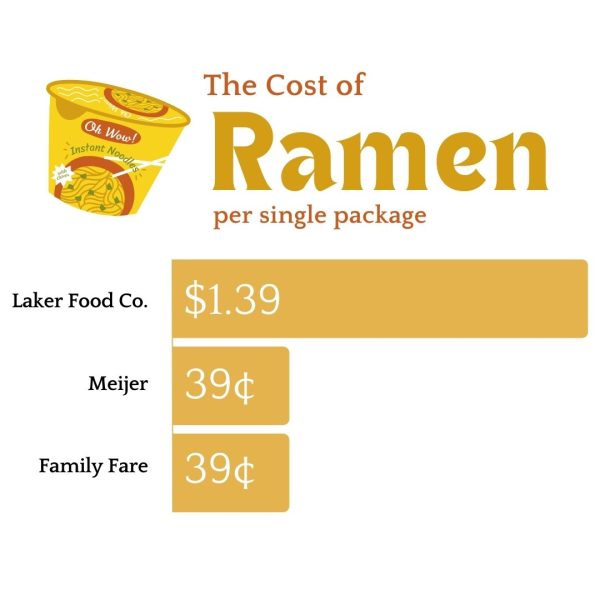
Many students are aware of these price hikes and are often more weary of shopping on campus because of it.
“I understand that campus needs to make money off of what they are selling, but it doesn’t make sense why they have the price so high,” Hannah Bernhardt, a junior at GVSU, said. “Personally, I don’t think the prices should be that high as we are all college students who aren’t making all that much money. I would rather drive 10 minutes down the road to Meijer to buy the same thing for a little cheaper of a price.”
However, many students may not have the option to get necessary goods somewhere else and feel the on-campus prices can be limiting.
“I only buy things from the C-Store when I need to, like in this case. If I had the choice I would have easily waited and bought it somewhere else,” Meteer said. “If prices were lower students could use the C-Store more, but they can’t right now because of the prices they see at the store.”
Although students may be frustrated with the prices that GVSU is charging in on-campus convenience stores, Dalela said price-mark-ups are legal, common and often remain acceptable as long as people are willing to pay convenience pricing.
“You would expect Grand Valley to have a store, which has more reasonable prices rather than higher prices, but, at the end of the day, these are small everyday consumer items, and I don’t think at this pricing level, ethics aren’t playing any significant role,” Dalela said. “They (companies) will test our limits, without being challenged by anybody on the legal front or on the ethical front of anyway, because they aren’t really flouting any rules here. There is no legal framework, which says your markups have to be limited to a certain level.”
Meteer said although the C-Store and P.O.D. stores on the GVSU campus are more accessible, she tries to avoid shopping at them for a variety of reasons including cost and how the costs relate to her student wages.
Meteer works on-campus jobs to pay for her living expenses and feels the wages students are being paid, often which are under the calculated living wage for the area, cannot even meet the expense of shopping at the on-campus convenience stores.
“I can’t afford to shop at the C-Store with the wages I’m paid on campus, as for pretty much all student employees,” Meteer said. “If you look at what Grand Valley wants to charge you pretty much for everything, the student wages don’t make up for that.”
Meteer feels that the university should reevaluate the prices on campus to keep the best interest of students in mind.
“I think Grand Valley needs to be aware that everyone, especially students, are struggling financially,” Meteer said. “They need to keep the prices as low as possible, like at least the price I would get somewhere off campus.”
Laker Food Co. did not respond to several requests for comment before publication.




